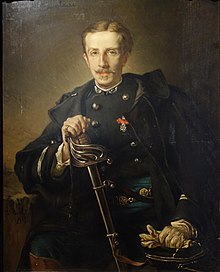Paul Déroulède
| Paul Déroulède | |
|---|---|

|
|
| Born | 2 September 1846 Paris, France |
| Died | 30 January 1914 (aged 67) |
| Allegiance |
|
| Service/branch | French Army |
| Years of service | 1870-1874 |
| Rank | Lieutenant |
| Battles/wars | Franco-Prussian War |
Paul Déroulède (2 September 1846 – 30 January 1914) was a French author and politician, one of the founders of the nationalist League of Patriots.
Déroulède was born in Paris. He was published first as a poet in the magazine Revue nationale, with the pseudonym "Jean Rebel". In 1869 he produced, at the Théâtre Français, a one-act drama in verse named Juan Strenner.
At the beginning of the Franco-Prussian War he enlisted as a private, but was wounded and taken prisoner at the Battle of Sedan. He was sent to Breslau (now Wrocław), but escaped. He then served with generals Antoine Chanzy and Charles Denis Bourbaki, participated with the latter's disastrous retreat to Switzerland, and fought against the Paris Commune. After being promoted to lieutenant, he was forced by an accident to retire from the army.
In 1872, he published a collection of patriotic poems (Chants du soldat), which enjoyed great popularity. This was followed in 1875 by another collection, Nouveaux Chants du soldat. In 1877 he produced a drama in verse named L'Hetman, which derived a moderate success from the patriotic fervour of its sentiments. For the exhibition of 1878 he wrote a hymn, Vive la France, which was set to music by Charles Gounod. In 1880 his drama in verse, La Moabite, which had been accepted by the Théâtre Français, was censored for religious reasons.
In 1882 Déroulède, along with the historian Henri Martin and Félix Faure, founded the Ligue des patriotes, to promote France's "revanche" against Germany. Déroulède served initially as the deputy to vice-president Faure, and the league quickly attained a membership of 182,000, a relatively large number for the time. Déroulède eventually became the president of the league, in March 1885. The league sought education reforms intended to increase patriotism among French students, but when those reforms were ignored by the French legislature Déroulède began to despair of "parliamentarism" as a method of reform.
...
Wikipedia
